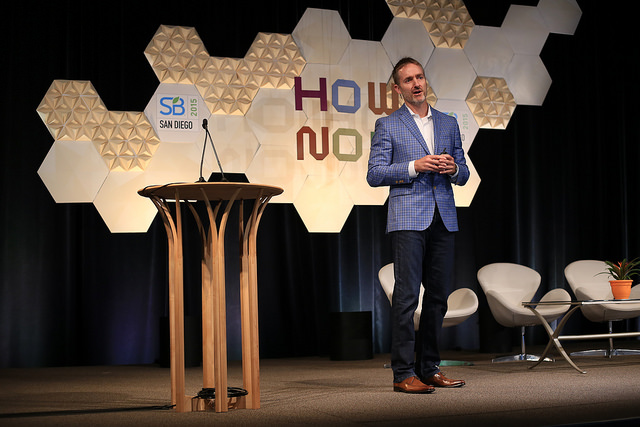Craig Shiesley is a man with personal and professional passion for both food and sustainability. His background in Consumer Packaged Goods (CPG) gave him the experience to join WhiteWave Foods seven years ago, where he is now president of the Silk and So Delicious brands. He was brought on by WhiteWave to evangelize and democratize these niche businesses. We met with Shiesley to discuss his mission with Silk brand products.
Shiesley will tell you that he has very a personal attachment to his work. Issues in his family with severe food allergies enlightened him to the importance of proper labeling and being more transparent in food supply (Silk was one of the early members of the Non-GMO Project, and advocates for mandatory national GMO labeling). Furthermore, Shiesley himself was diagnosed with celiac disease five years ago, which made him much more sensitive regarding the content of foods. With these personal issues as motivational drivers, Shiesley started to feel as though something was “busted” in the food system in light of all of the allergies and food-related diseases that weren’t prevalent in the past.
All that having been said, Shiesley is a president that truly stands behind Silk. First of all, Silk is a plant-based product, and plant-based nutrition is better for your health than animal-based nutrition since plant-based products generally have fewer calories, lower sugar, and no cholesterol. Secondly, plant-based consumption is the way forward for a better, more sustainable future. A myriad of sustainability studies in recent years indicate that the world must change the way we produce, distribute, and consume our foods, or we will not be able to feed the world’s growing population given the already-fragile environment in which we live. For instance, global meat production is five times what it was in the 1950s, and studies have shown that if we continue to live, produce and eat food the way we do today, feeding a population of nine billion will require more than 3.5 planet Earths by 2050.
Plant-based diets are one solution that can help us work our way out of this crisis. Silk supports its role in this effort with the results of a peer-reviewed life-cycle assessment comparing the production of Silk versus conventional milk. This study showed that carbon emissions from the production of Silk products are 60 percent lower than those resulting from the production of conventional milk. Moreover, conventional milk production is so water-intensive that substituting a just a half-gallon of Silk for conventional milk saves 900 gallons of water.
Evangelizing the benefits of Silk to the world is Craig Shiesley’s mission. In the past, Silk has always been perceived as a vegan product, but it is rapidly becoming more mainstream. Seven years ago, only thirteen percent of households consumed Silk; today, over 20 percent consume the product, and plant-based milk has been the fastest growing category in all of grocery for the past three to four years.
The trick to swaying traditional milk consumers to adopt plant-based dairy products lies in convincing consumers that they are not compromising taste in order to achieve health or sustainability benefits. Shiesley will argue that Silk tastes as good or better than any milk or dairy equivalent. Of course, each consumer has his or her own palate, and so Shiesley suggests that sensitive consumers take small steps in changing their milk consumption. Every little bit of plant-based milk consumed in lieu of conventional milk does your body and the planet good.
Silk’s quest to expand the adoption of more plant-based foods and make them accessible to more people also includes a new product that is available through the federal Women, Infants and Children program. This program will provide low-cost access to those who could benefit most from Silk’s plant-based products.
Shiesley’s vision for the future of the Silk brand is to continue to make Silk products more accessible, affordable, and appealing. Said Shiesley, “The more people who consume our category, the better we are for the world as well as for their own personal health, so we’re going to continue to evangelize that.”
Unselfishly, he acknowledged that the shift to scalable change will occur with other like-minded companies come along with us. Shiesley continued, “It’s all about like-minded companies coming together. I think the consumer is open, regulations are becoming more open, and the time is now to have a really cogent story and make some changes.”
What is Shiesley’s advice for those interested in improving sustainability? Don’t put the burden of global sustainability on your customers’ shoulders. Instead, in whatever industry you’re in, find what consumers desire and then ask them to make one small step, one small change. Connect that change to their family’s health and life, and then connect that to the global impact that they can have. All of those little changes, over time, can accumulate to effect monumental and lasting change.



